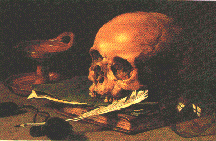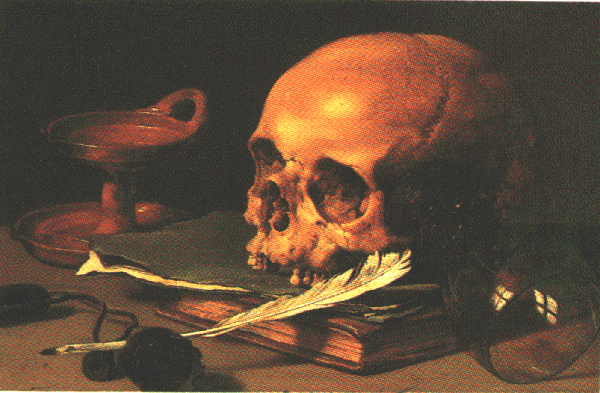



100.193
Section 1: Wednesdays, 10 a.m.- 12 noon
Section 2: Wednesdays, 2 p.m.- 4 p.m.
202 Shaffer Hall
How do historians evaluate evidence and draw conclusions about the past? How persuasive is the thesis of Simon Schama's Dead Certainties that "the asking of questions and the relating of narratives need not ... be mutually exclusive forms of historical representation," and that history ultimately must be "a work of the imagination"? After probing these and other issues, and writing their own 'histories' based upon the document packets, students focus on Allen Weinstein's Perjury: The Hiss-Chambers Case to discuss whether historians can ever determine "the truth" no matter how rich the evidence. For the reference to the above graphic click here.
Simon Schama, Dead Certainties New York: Alfred A. Knopf, 1991,
"Captain Berry's Will, 1784" a document packet,
"Is Baltimore Burning?" a document packet on the meaning, legality, and consequences of rhetoric, 1964-1968,
Allen Weinstein, Perjury. The Hiss Chambers Case. New
York: Alfred A. Knopf, 1978.
All reading should be completed according to the schedule and in advance of class discussion. A short (3-4 page) essay based upon the assigned reading is due the class following the last class in which the book or Document Packet is discussed. Critical essays on the two books should include your reactions to the arguments in the book and your reflections on how convincing the author is. For the first assignment, book reviews by other authors will be provided, but for the second book, students will be expected to seek out reviews at the library and to include in their essay any criticisms found to be relevant.
The essay for Dead Certaintieswill be due on Wednesday, October 18 . The essay
for Perjury is due on Wednesday, December 13. Essays based
upon the document packets are meant to be your own efforts at writing
what you conclude (from our reading and discussion of Schama) is the
most effect and persuasive manner in which history ought to
be written. Essays on the Document Packets are due as noted on the
schedule: Wednesday, November 1, for "Captain Berry's Will" and Wednesday, November 22,
for "Is Baltimore Burning?."
In addition, each member of the class will be expected to submit a final paper of no more than 20 pages in length in which the Hiss case will be examined and argued from the perspective of one of the key players in the story (i.e. Alger Hiss (see: Recollections of a Life,1988), Donald Hiss, Whittaker Chambers (see Witness, 1952), Priscilla Hiss), or from the perspective of one of four contemporary observers, Earl William Allen Jowitt (The Strange Case of Alger Hiss,1953), Alistair Cooke (A Generation on Trial,1952), Meyer Zeligs (Friendship and Fratricide,1967), or John Chabot Smith (Alger Hiss: The True Story,1976). I also would be amenable to students assuming the perspective of any other person directly connected with the case if the choice is made and discussed before we end the discussion of Perjury. The final paper will be due the last night of class (Wednesday, December 20). At that class, as a final exam, students will be expected to present their conclusions orally, engage in a spirited defense of their assumed points of view, and rate each other's presentations anonymously. Because the Weinstein book is out of print and hard to find, it will be available in searchable text format in the academic computing lab beginning October 11. Students should commence reading Weinstein after that date according to the suggested schedule and are expected to submit a 1-2 page abstract of the argument of the final essay on November 29.
The abstract and all papers are to be submitted on disk as well as on paper. The syllabus and most reading materials are available on WEB and locally on the network in the academic computing lab, 170 Krieger Hall. This course is intended to be an introduction to the resources and tools for history available on the internet and the World Wide Web. Students are expected to own a copy of The Mosaic Handbook for Microsoft Windows which includes a license to use EMOSAIC. Although any wordprocessor that can export to a simple text file can be used to prepare papers, they must be submitted on disk in a basic HTML format readable and printable by the EMOSAIC browser.
Each of the two review essays will be worth up to fifteen points each; each of the two 'narrative' essays based upon the documents will be worth up to fifteen points each; the
final paper will be worth up to thirty-five points of which up to five points will be based upon the oral presentation at the final. Up to five points of the total grade will be based upon over-all class participation. Five points will be deducted for every day an assignbment is late.
A=90-100 points; B=80-89 points; C=70-79 points; D=60-69 points; F=
anything less than 60 points.
NOTE: The direct quoting of someone else's work (anything more than a phrase or two) without using quotation marks and citing the specific source of the quote (author, title, edition, and page) will not be tolerated and will result in an automatic 'F' on the assignment. Adopting an author's point of view is not considered plagiarism as long as the source is identified by some form of annotation of your text (i.e. footnotes, Turabian short form; note on sources at the end of your essay or review, or some other format approved in advance by the instructor).
ęDr. Edward C. Papenfuse (instructor)
State Archivist
Maryland State Archives
Phone: (o) 410-260-6401
Email: edp@mdsa.net
Last update: 13 September 1995